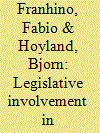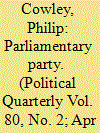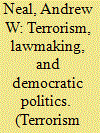| Srl | Item |
| 1 |
ID:
093219


|
|
|
|
|
| Publication |
2009.
|
| Summary/Abstract |
In parliamentary systems, the need to preserve the political agreement that sustains the executive often motivates legislative involvement in policymaking. Institutional arrangements regulating executive-legislative relations and ministerial autonomy also structure parliamentary participation. However, empirical evidence of these effects remains limited to a few policies and countries. European Union legislation provides the opportunity to test expectations about legislative involvement for different types of measure across various institutional arrangements, across multiple policy areas, and across time. In this article, we investigate legislative involvement in the transposition of 724 directives in 15 member states from 1978 to 2004. Our results confirm that involvement increases as conflict between the responsible minister and her coalition partners intensifies. The discretionary scope embedded in the directive further inflates this effect. Additionally, parliamentary involvement decreases as the government's institutional advantage over the legislature increases, especially if intracoalitional conflict deepens.
|
|
|
|
|
|
|
|
|
|
|
|
|
|
|
|
| 2 |
ID:
092367


|
|
|
|
|
| Publication |
2009.
|
| Summary/Abstract |
The Conservative parliamentary party will fulfill three important functions for any incoming Conservative government: it will be the focus of attention for the national media; it will be the bulk vote that will deliver its legislative programme; it will form the talent pool from which members of any incoming government will be recruited. A majority Conservative government could see a majority of its MPs newly elected, with more Conservative women and ethnic minority MPs than ever before (although there will be little change in the socio-economic background of their MPs). These new MPs will present problems in terms of party management, although they will be less likely to rebel than longer-serving MPs. There are also relatively few signs of discontent among incumbent Conservative MPs (the article identifies the most rebellious Conservative MPs). Any new Conservative government will also have to deal with a reformed House of Lords, in which it will no longer have a majority.
|
|
|
|
|
|
|
|
|
|
|
|
|
|
|
|
| 3 |
ID:
113268


|
|
|
|
|
| Publication |
2012.
|
| Summary/Abstract |
Counterterrorist law is all too often made in a rushed, reactive, and repetitious way, marginalizing the deliberative, critical, and democratic functions of legislatures and leading to outcomes that later prove to be unconstitutional and counter-productive for public security. Using a political sociology approach, the article offers an analysis and theorisation of the practice of counterterrorist lawmaking. Through the UK example, the article argues that counterterrorist lawmaking compounds the existing unequal power relationships of the parliamentary field, and presents legislators with an inscrutable dilemma about the true stakes involved in legislative security politics.
|
|
|
|
|
|
|
|
|
|
|
|
|
|
|
|